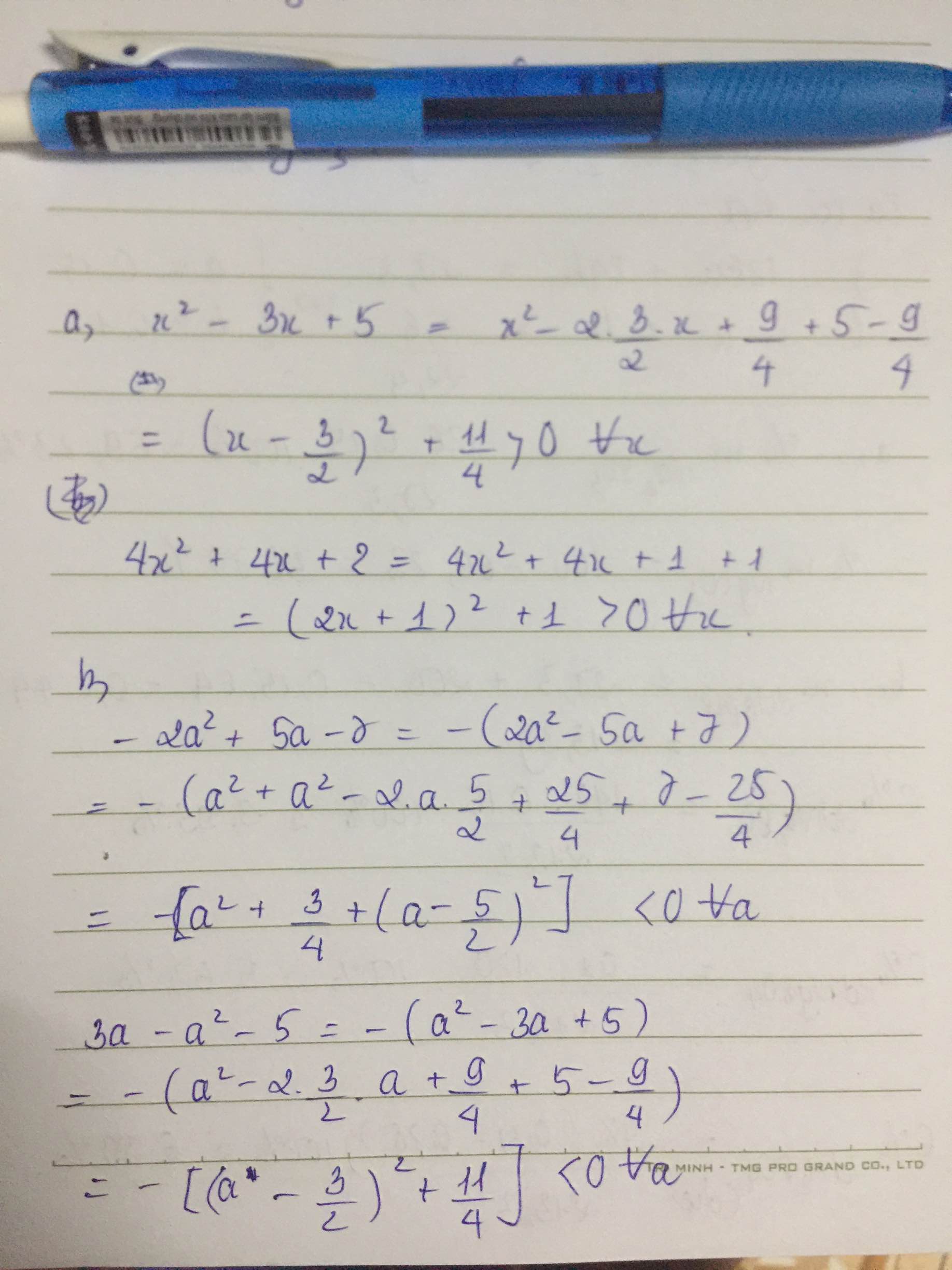

Hãy nhập câu hỏi của bạn vào đây, nếu là tài khoản VIP, bạn sẽ được ưu tiên trả lời.



a) \(A=x^2+2x+5=\left(x+1\right)^2+4\ge4>0\)
Vậy MIN A = 4 khi x = -1
b) \(B=x^2+4x+12=\left(x+2\right)^2+8\ge8>0\)
Vậy MIN B = 8 khi x = -2
c) \(C=x^2+6x+31=\left(x+3\right)^2+22\ge22>0\)
Vậy MIN C = 22 khi x = -3
d) \(D=4x^2+4x+35=\left(2x+1\right)^2+34\ge34>0\)
Vậy MIN D = 34 khi x = -1/2
\(A=x^2+2x+5\)
\(A=\left(x^2+2.x.1+1^2\right)+4\)
\(A=\left(x+1\right)^2+4\)
Ta có: \(\left(x+1\right)^2\ge0\forall x\)
\(\Rightarrow\left(x+1\right)^2+4\ge4\forall x\)
\(\Rightarrow A>0\forall x\)
\(A=4\Leftrightarrow\left(x+1\right)^2=0\Leftrightarrow x=-1\)
Vậy \(A_{min}=4\Leftrightarrow x=-1\)
\(B=x^2+4x+12\)
\(B=\left(x^2+2.x.2+2^2\right)+8\)
\(B=\left(x+2\right)^2+8\)
đến đó tương tự câu a
\(C=x^2+6x+31\)
\(C=\left(x^2+2.x.3+3^2\right)+22\)
\(C=\left(x+3\right)^2+22\)
đến đó tương tự câu a
\(D=4x^2+4x+35\)
\(D=\left(2x\right)^2+2.2x.1+1+34\)
\(D=\left(2x+1\right)^2+34\)
đến đó tương tự câu a
Tham khảo nhé~

a/ \(x^2-6x+10=x^2-2.x.3+3^2+1=\left(x-3\right)^2+1\)
Với mọi x ta có :
\(\left(x-3\right)^2\ge0\)
\(\Leftrightarrow\left(x-3\right)^2+1>0\)
\(\Leftrightarrow x^2-6x+10>0\)
b/ \(x^2-4x+7=x^2-2.x.2+2^2+3=\left(x-2\right)^2+3\)
Với mọi x ta có :
\(\left(x-2\right)^2\ge0\)
\(\Leftrightarrow\left(x-2\right)^2+3\ge3\)
\(\Leftrightarrow x^2-4x+7\ge3\left(đpcm\right)\)
c/ \(x^2+x+1=x^2+2.x.\dfrac{1}{2}+\left(\dfrac{1}{2}\right)^2+\dfrac{3}{4}=\left(x+\dfrac{1}{2}\right)^2+\dfrac{3}{4}\)
Với mọi x ta có :
\(\left(x+\dfrac{1}{2}\right)^2\ge0\)
\(\Leftrightarrow\left(x+\dfrac{1}{2}\right)^2+\dfrac{3}{4}>0\)
\(\Leftrightarrow x^2+x+1>0\left(đpcm\right)\)
d/ \(x^2+y^2+4x-6y+15=\left(x^2+4x+2^2\right)+\left(y^2-6y+3^2\right)+2=\left(x+2\right)^2+\left(y-3\right)^2+2\)
Với mọi x,y ta có :
\(\left\{{}\begin{matrix}\left(x+2\right)^2\ge0\\\left(y-3\right)^2\ge0\end{matrix}\right.\)
\(\Leftrightarrow\left(x+2\right)^2+\left(y-3\right)^2\ge0\)
\(\Leftrightarrow\left(x+2\right)^2+\left(y-3\right)^2+2\ge0\)
\(\Leftrightarrow x^2+y^2+4x-6y+15>0\left(đpcm\right)\)
2/ Ta có :
\(\left(a+b\right)^2-4ab=a^2+2ab+b^2-4ab=a^2-2ab+b^2=\left(a-b\right)^2\)
Vậy \(\left(a-b\right)^2=\left(a+b\right)^2-4ab\left(đpcm\right)\)
3/ \(x^2+y^2=x^2+y^2+2xy-2xy=\left(x+y\right)^2-2xy\)
Mà \(x+y=7;xy=-3\)
\(\Leftrightarrow x^2+y^2=7^2-2.\left(-3\right)=49+6=55\)

1/
a/ \(a^2\left(a+1\right)+2a\left(a+1\right)=a\left(a+1\right)\left(a+2\right)\)
Vì a(a+1)(a+2) là tích của 3 số nguyên liên tiếp nên chia hết cho 2 và 3
Mà (2,3) = 1 nên a(a+1)(a+2) chia hết cho 6. Ta có đpcm
b/ Đề sai , giả sử với a = 3
c/ \(x^2+2x+2=\left(x^2+2x+1\right)+1=\left(x+1\right)^2+1>0\)
d/ \(x^2-x+1=\left(x^2-x+\frac{1}{4}\right)+\frac{3}{4}=\left(x-\frac{1}{2}\right)^2+\frac{3}{4}>0\)
e/ \(-x^2+4x-5=-\left(x^2-4x+4\right)-1=-\left(x-2\right)^2-1< 0\)
2/ a/ \(x^2-6x+11=\left(x^2-6x+9\right)+2=\left(x-3\right)^2+2\ge2\)
BT đạt giá trị nhỏ nhất bằng 2 tại x = 3
b/ \(-x^2+6x-11=-\left(x^2-6x+9\right)-2=-\left(x-3\right)^2-2\le-2\)
BT đạt giá trị lớn nhất bằng -2 tại x = 3

a, \(A=2x^2+4x+5=2x^2+4x+2+3\)
\(=2\left(x+1\right)^2+3>0\)
\(\Rightarrowđpcm\)
b, \(B=-3x^2+6x-7=-3x^2+6x-3-4\)
\(=-3\left(x-1\right)^2-4< 0\)
\(\Rightarrowđpcm\)
\(A=2x^2+4x+5\)
\(\Rightarrow A=2x^2+4x+2+3\)
\(\Rightarrow A=2\left(x+1\right)^2+3\)
\(\Rightarrow A>0\left(ĐPCM\right)\)

\(\left(3a-1\right)^2=9a^2-6a+1\)
\(\left(a-2\right)^2=a^2-4a+4\)
\(\left(1-5a\right)^2=1-10a+25a^2\)
\(\left(3a-2b\right)^2=9a^2-12ab+4a^2\)
\(\left(4-3a\right)^2=16-24a+9a^2\)
\(\left(5a-4b\right)^2=25a^2-40ab+16b^2\)
\(\left(5a-3b\right)\left(5a+3b\right)=25a^2-9b^2\)
\(\left(3x+1\right)\left(3x-1\right)=9x^2-1\)
\(\left(5x^2-2\right)\left(5x^2+2\right)=25x^4-4\)
\(\left(2a+\dfrac{1}{2}\right)\left(2a-\dfrac{1}{2}\right)=4a^2-\dfrac{1}{4}\)
\(\left(3x^2-y\right)\left(3x^2+y\right)=9x^4-y^2\)
\(\left(\dfrac{1}{2}x-1\right)\left(\dfrac{1}{2}x+1\right)=\dfrac{1}{4}x^2-1\)
\(\left(\dfrac{3}{4}x+2\right)\left(\dfrac{3}{4}x-2\right)=\dfrac{9}{16}x^2-4\)
\(\left(5x-\dfrac{3}{2}\right)\left(5x+\dfrac{3}{2}\right)=25x^2-\dfrac{9}{4}\)
\(\left(2a^2-7\right)\left(2a^2+7\right)=4a^2-49\)

2.
Ta có hằng đẳng thức : \(\left(a-b\right)^2=a^2-2ab+b^2\left(1\right)\)
Lại có \(\left(a+b\right)^2=a^2+2ab+b^2\)
\(\Rightarrow\left(a+b\right)^2-4ab=a^2+2ab-4ab+b^2\)
\(\Leftrightarrow\left(a+b\right)^2-4ab=a^2-2ab+b^2\left(2\right)\)
Từ (1) và (2) \(\Rightarrow\left(a-b\right)^2=\left(a+b\right)^2-4ab\)( đpcm )
3.
Ta có hằng đẳng thức \(\left(x+y\right)^2=x^2+2xy+y^2\)
\(\Rightarrow x^2+y^2=\left(x+y\right)^2-2xy\)
Thay \(x+y=7\)và \(xy=-3\)vào ta được :
\(x^2+y^2=7^2-2\left(-3\right)\)
\(\Leftrightarrow x^2+y^2=49+6=55\)
Vậy ...
1.
a) Đặt \(A=x^2-6x+10\)
\(A=\left(x^2-6x+9\right)+1\)
\(A=\left(x-3\right)^2+1\)
Mà \(\left(x-3\right)^2\ge0\forall x\)
\(\Rightarrow A\ge1>0\)
Vậy ...
b) Đặt \(B=x^2-4x+7\)
\(B=\left(x^2-4x+4\right)+3\)
\(B=\left(x-2\right)^2+3\)
Mà \(\left(x-2\right)^2\ge0\forall x\)
\(\Rightarrow B\ge3\)
Vậy ...

a) ( 5 - 2x )( 2x + 7 ) - 4x2 + 25 = 0
<=> ( 5 - 2x )( 2x + 7 ) + ( 5 - 2x )( 5 + 2x ) = 0
<=> ( 5 - 2x )( 2x + 7 + 5 + 2x ) = 0
<=> ( 5 - 2x )( 4x + 12 ) = 0
<=> \(\orbr{\begin{cases}5-2x=0\\4x+12=0\end{cases}}\Leftrightarrow\orbr{\begin{cases}x=\frac{5}{2}\\x=-3\end{cases}}\)
b) ( 5x2 + 3x - 2 )2 - ( 4x2 - x - 5 )2 = 0 ( như này chứ nhỉ ? )
<=> [ ( 5x2 + 3x - 2 ) - ( 4x2 - x - 5 ) ][ ( 5x2 + 3x - 2 ) + ( 4x2 - x - 5 ) ] = 0
<=> ( 5x2 + 3x - 2 - 4x2 + x + 5 )( 5x2 + 3x - 2 + 4x2 - x - 5 ) = 0
<=> ( x2 + 4x + 3 )( 9x2 + 2x - 7 ) = 0
<=> ( x2 + x + 3x + 3 )( 9x2 + 9x - 7x - 7 ) = 0
<=> [ x( x + 1 ) + 3( x + 1 ) ][ 9x( x + 1 ) - 7( x + 1 ) ] = 0
<=> ( x + 1 )( x + 3 )( x + 1 )( 9x - 7 ) = 0
<=> ( x + 1 )2( x + 3 )( 9x - 7 ) = 0
<=> x + 1 = 0 hoặc x + 3 = 0 hoặc 9x - 7 = 0
<=> x = -1 hoặc x = -3 hoặc x = 7/9
c) 15x4 - 8x3 - 14x2 - 8x + 15 = 0
<=> 15x4 + 22x3 - 30x3 + 15x2 + 15x2 - 44x2 - 30x + 22x + 15 = 0
<=> ( 15x4 + 22x3 + 15x2 ) - ( 30x3 + 44x2 + 30x ) + ( 15x2 + 22x + 15 ) = 0
<=> x2( 15x2 + 22x + 15 ) - 2x( 15x2 + 22x + 15 ) + ( 15x2 + 22x + 15 ) = 0
<=> ( 15x2 + 22x + 15 )( x2 - 2x + 1 ) = 0
<=> ( 15x2 + 22x + 15 )( x - 1 )2 = 0
<=> \(\orbr{\begin{cases}15x^2+22x+15=0\\\left(x-1\right)^2=0\end{cases}}\)
+) ( x - 1 )2 = 0 <=> x = 1
+) 15x2 + 22x + 15 = 15( x2 + 22/15x + 121/225 ) + 104/15 = 15( x + 11/25 )2 + 104/15 ≥ 104/15 > 0 ∀ x
Vậy phương trình có nghiệm duy nhất là x = 1

1) \(A=x^2+2x+2=\left(x+1\right)^2+1\ge1>0\left(\forall x\right)\)
2) \(B=x^2+6x+11=\left(x+3\right)^2+2\ge2>0\left(\forall x\right)\)
3) \(C=4x^2+4x-2=\left(2x+1\right)^2-2\ge-2\) chưa chắc nhỏ hơn 0
4) \(D=-x^2-6x-11=-\left(x+3\right)^2-2\le-2< 0\left(\forall x\right)\)
5) \(E=-4x^2+4x-2=-\left(2x-1\right)^2-1\le-1< 0\left(\forall x\right)\)
1. \(A=x^2+2x+2=\left(x+1\right)^2+1\)
Vì \(\left(x+1\right)^2\ge0\forall x\)\(\Rightarrow\left(x+1\right)^2+1\ge1\)
=> Đpcm
2. \(B=x^2+6x+11=\left(x+3\right)^2+2\)
Vì \(\left(x+3\right)^2\ge0\forall x\)\(\Rightarrow\left(x+3\right)^2+2\ge2\)
=> Đpcm
3. \(C=4x^2+4x-2=-\left(4x^2-4x+2\right)\)
\(=-\left(4\left(x-\frac{1}{2}\right)^2+1\right)\)
Vì \(\left(x-\frac{1}{2}\right)^2\ge0\forall x\Rightarrow4\left(x-\frac{1}{2}\right)^2+1\ge1\)
\(\Rightarrow-\left(4\left(x-\frac{1}{2}\right)^2+1\right)\le1\)
=> Đpcm
4,5 làm tương tự